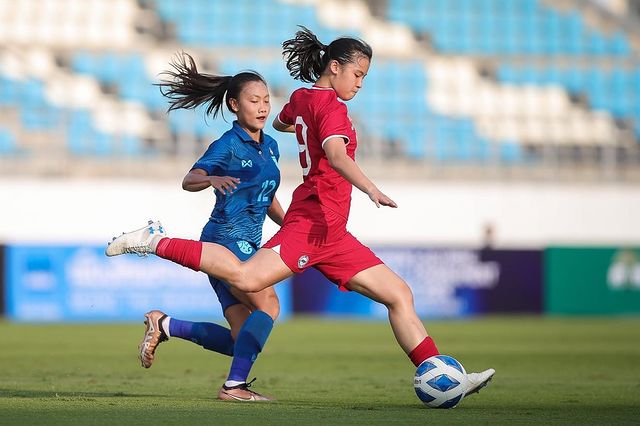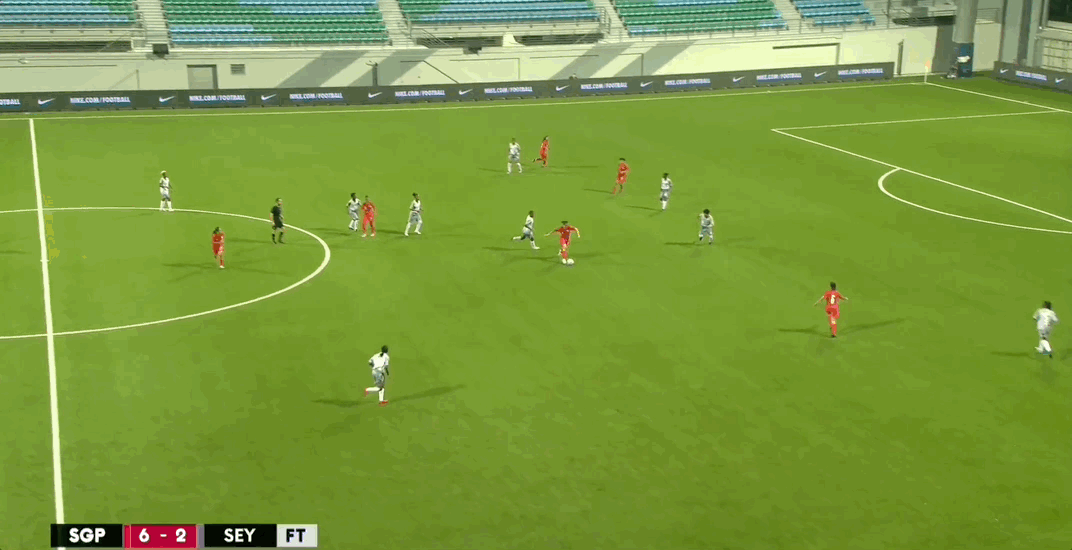Taken from source: https://mothership.sg/2023/05/danelle-tan-interview/
Danelle Tan has already made history, but she’s only just getting started.
Danelle Tan is having the time of her life.
She’s hard at work preparing for her A-level examinations while managing her chosen extracurricular activity, football — just like many other Singaporeans 18-year-olds.
Except she’s doing it in the UK, at Mill Hill school, while playing in the FA Women’s National League South, making her the first female Singaporean to play in a European league.
Tan also plays for Singapore, and holds the record as Singapore’s youngest international goalscorer.
With her track record, and her goal of going professional, it might surprise you to know that for Tan, football was once “just a hobby”.
Over a video call with Mothership just before her sixth game for her club, the London Bees, Tan reflected on her journey so far, and what might come next.
By Danelle Tan, as told to Nigel Chua
Hi Danelle! Please introduce yourself.
My name is Danelle Tan, I play for the Singapore National Team. I have 15 caps and three goals.
I recently moved to London at the start of 2022, and I’m currently playing for a club called London Bees in the third tier of the UK Women’s [Football] League.
How is playing for the London Bees?
I’ve been off to a really good start.
I’ve scored two goals in five games now, and I really enjoy the close team environment. I’m really excited for how the season will pan out and happy to contribute with any goals.
We’re currently third from the bottom in the league table, fighting a relegation battle.
I’m expecting a tough fight. A lot of the games that I’ve played in so far have been extremely physical and competitive.

Tan jostling with an opponent to retain possession for her team. GIF from video by Danelle Tan on Instagram.
How are you adjusting to the new environment?
I train with my club on Tuesday, Wednesday, Friday, and then we have a game on Sunday.
I do extra running on Monday, and I keep one day completely free to rest — most of the time, that is Thursday.
It’s a lot of sacrifice and discipline. Everyone only has 24 hours in a day, and if I’m spending most of my time studying or on the football field, then there’s not a lot more time to hang out with friends or go on social media.
I think what really helped me assimilate easier was the level of support from my own teammates.
I’ll tell you an example.
My captain, Ashleigh Goddard, has been incredibly encouraging and supportive.
I made my debut for the club by coming on at half time in a game against Plymouth Argyle.
Before the match, she came up to me and said, “We all know you have the skills and the capabilities, now you just have to show it on the pitch.”
It really gave me a boost of confidence and spurred me on for the match.
The last game I played against Billericay Town Football Club, I scored. It felt like a culmination of all my hard work and sacrifices I’ve had to make, stepping out of my comfort zone, living alone in London.
I scored first, and it was an important goal. They then equalised in the last minute, and the whole team was absolutely gutted.
But that’s football.
Where does their passion come from?
In the UK, you always hear people say football is their religion.
And you never really understand it until you’ve been there, until you really see some of these fans that go through such great lengths just to support their club and watch football.
Their whole lives revolve around football. It’s like their entire life. That passion, that drive, it really stands out.
It’s just the whole community you’re brought up with. If all your parents think about is football, you’re likely to be very similar to them.
For a lot of these players, football is their lives.
Do you see that passion rubbing off on you?
Oh, definitely. It starts in training. All my teammates, my coaches, demand the highest standards. And you start demanding high standards of yourself as well. If it’s a misplaced pass, you’re like, “I could have done better.”
And so you mould to the environment, you bring it from training into the game and you really fight for and with your team.
If you’re the only one on the field not willing to put your whole body on the line for the team, or go all out, you’re gonna stick out like a sore thumb.
I try to approach every game the same way, whether it’s a League game or a Cup final.
I always try to put my all into each game, be it with London Bees or with the National Team.
I always go in with my all.
How do games in the UK differ from international games where you play for Singapore?
There’s nothing quite like playing for your country. Playing with the flag on your chest, singing the national anthem before every game.
It’s a huge pride and honour. Representing my country in the sport I love is a privilege.

Tan playing for Singapore in an Apr. 4 game against Mongolia in Round 1 of the Asian Qualifiers for the Paris 2024 Women’s Olympic Football Tournament. Photo via Danelle Tan on Instagram.
Every time I walk out of the tunnel, huddle in a tight circle with my teammates and cheer “Majulah Singapura”, it will always be special and something I don’t take for granted.
Going into every game fighting for my country, knowing that everyone in Singapore stands behind in support.
You’ve played football since you were six. Did you always want to play for the national team?
I did a whole host of sports growing up. I just love playing.
But from age six to twelve, I was not taking football seriously at all. I just enjoyed going out on the field, meeting new friends, playing the game. It was just a hobby.
I don’t think I actually knew there was a national team.
And then in 2018, at age 13, I had the chance to go to Arsenal and have a training stint with their under-15 academy.
And in 2019 I went to Ajax, in Amsterdam, to train with the Ajax talent team, the team just below the professional team.
Those two trips were really eye openers — I got to see the highest level of girls my age around the world.
That was the first time I realised, “Hold up, becoming a professional footballer could actually be a career.”
I looked at all these players who live, breathe, everything football. This is their life. This is their career.
It really dawned on me that it was possible — that the career path was viable.
I can’t tell you exactly when it clicked for me, but somewhere between 2018 and 2022, I realised that I actually really wanted to play football professionally.
And to pursue that dream, moving overseas, it wasn’t really a question of “if”, it was more a question of “when”.
I had played for the senior national team in Singapore and my growth was starting to sort of plateau, because there was there’s a ceiling, right?
And so to continually challenge myself, I knew that I had to move. And when the opportunity presented itself I took the chance and moved to London in 2022.
It was a huge step out of my comfort zone, but I think it’s been deeply rewarding in terms of improving and developing me as a player and also as a person.
So it’s only been about five years since you started to take football more seriously. How would you describe the journey so far?
I would say I’m always very grateful for the opportunities given.
I’ve been very lucky with my whole journey. There were ups and downs.
One of the lowest lows of my career so far was when I tore my medial collateral ligament in 2019.
I was in the gym [for rehab exercises] every day, not stepping onto the field at all, and it was really tough.
But the majority of it has been ups.
I was lucky to get the opportunity to make my international debut as a 14-year-old. I was trying to break into the senior team.
At the time — it was 2019 — the national team already had a lot of very good players in my favourite position — the number 10, centre attacking midfielder.
But I’m very thankful that the coach believed enough in me and gave me the opportunity against Timor Leste, and I guess it paid off because I scored in that game.




